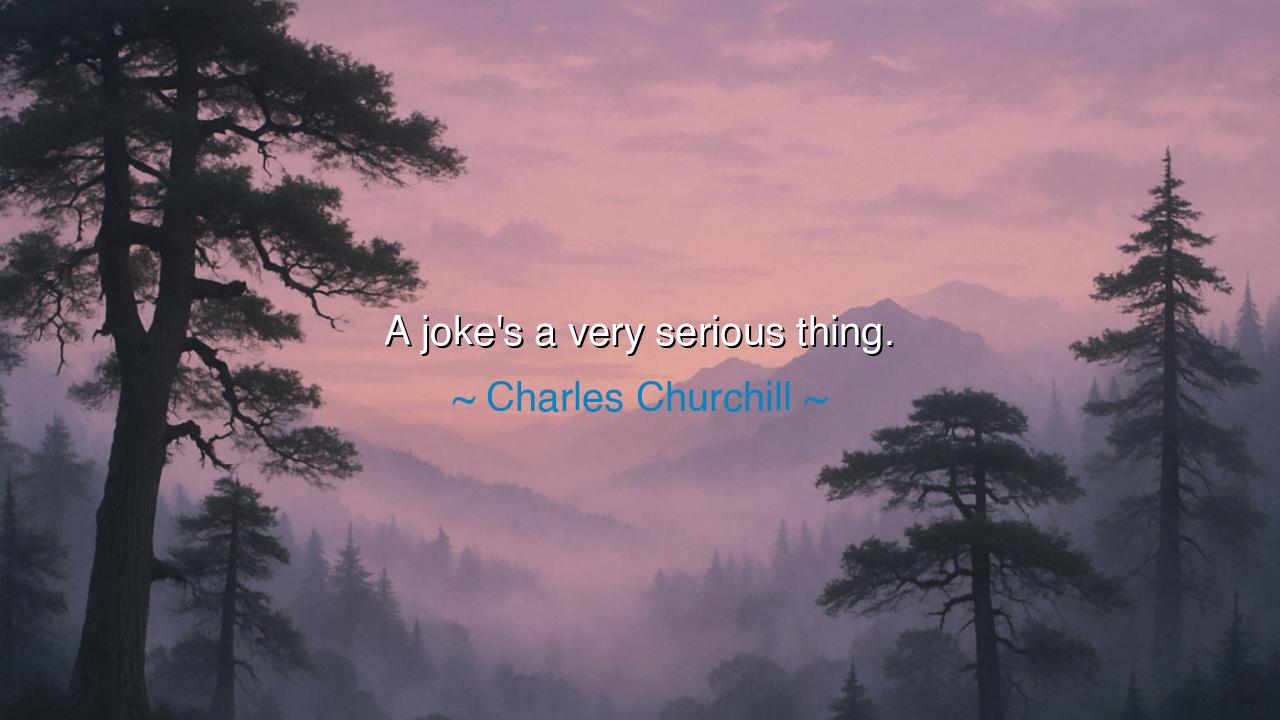
A joke's a very serious thing.






Hearken, children of the ages, and let your hearts attend the paradox of laughter, for in the words of Charles Churchill, “A joke’s a very serious thing.” Though the lips may curve in mirth and the eyes may glisten with delight, the seed of the joke carries within it the weight of truths that men oft dare not speak aloud. In the marketplace of Athens or the courts of Rome, the fool and the jester wielded tongues sharper than swords, for a jest, veiled in mirth, could cut through hypocrisy, expose folly, and ignite the minds of men toward reflection.
Long ago, in the courts of King Henry VIII, a humble court jester named Will Sommers whispered truths hidden beneath the guise of jest. His quips, though delivered with levity, restrained the ambitions of those who plotted in darkness. A king might have been moved to wrath or laughter, yet in that laughter lay a mirror of reality, reflecting the arrogance, pride, and folly of the mighty. Thus did the court learn that a joke, though clothed in frivolity, bore the gravitas of serious counsel.
Consider the arena of philosophers, where Socrates, walking the dusty roads of Athens, would employ irony and playful provocation. Through dialogues that seemed at first humorous, he revealed the profound errors of those who assumed wisdom yet possessed none. To the untrained eye, laughter was but a distraction; yet to the discerning, each jest carried a burden of insight, illuminating the depths of human ignorance and the path toward enlightenment. In this manner, the joke is akin to the spear cloaked in silk: soft to the touch, yet deadly in purpose.
Even in times of war, when the drumbeats of battle shook the land, humor has borne weighty meaning. During the trenches of the Great War, soldiers, facing the specter of death, shared witticisms and dark humor to steel their courage. The laughter that rang across the desolation was not empty; it was a shield against despair, a testament to the human spirit’s refusal to yield. In such moments, a joke is a fortress, holding aloft the fragile flame of hope against the darkness.
Yet, heed this: the seriousness of a joke lies not only in its power to enlighten or embolden but in its capacity to wound and reveal. Words, even when light, carry weight, and a jest misjudged may strike the innocent or embolden the malicious. Thus, one must wield humor as one wields a blade—mindful of its reach, measured in intention, and tempered with discernment. The wise understand that a jest can unmask kings, guide nations, or topple empires, for its simplicity conceals a gravity that shapes hearts and minds.
From the annals of history emerges another lesson. Voltaire, that master of satire, employed humor to challenge the dogmas of church and state. In his quills danced mockery and wit, yet beneath the jest lay serious philosophy, a call for freedom, reason, and the dignity of men. The laughter he provoked became a catalyst for thought, a gentle hammer that chipped away at the edifice of tyranny. Thus, even centuries past, the joke bore the mantle of serious change.
Therefore, children of the future, let your laughter be intentional and your mirth mindful. Understand that in a simple jest lies the power to illuminate truth, confront folly, and stir the soul to courage. Speak with humor, yes, but with wisdom; observe the world with a keen eye, and allow your words, even in jest, to carry the weight of sincerity. For the joke is no mere ornament of speech—it is a vessel of truth, a beacon in darkness, and a testament to the enduring power of the human spirit.
Let your hearts remember this: in every moment of levity, there lies a chance to teach, to heal, and to transform. Practice the art of humor with reverence. Listen before you jest, discern before you laugh, and wield your wit as one wields a sacred flame—bright, illuminating, and capable of revealing the deepest truths hidden in the shadows of the world. In this way, the words of Charles Churchill shall echo through the ages: indeed, a joke is a very serious thing.






AAdministratorAdministrator
Welcome, honored guests. Please leave a comment, we will respond soon